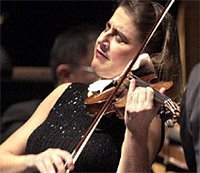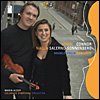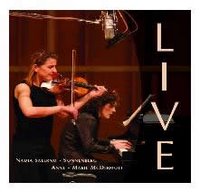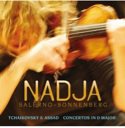 About 18 years ago, I attended a random program of the Toronto Symphony Orchestra at Roy Thomson Hall and watched as a lithe, passionate, sexy, astonishingly brilliant violinist played the shit out of the Mendelsohn violin concerto. I became hooked for life. In the time since, I have drawn her music into myself in a way that has since become a deep vital part of my creative process. This past October, Nadja Salerno Sonnenberg returned to RTH to perform the exact same program that had first won me. If that weren't enough, after almost five years without a recording, this year she has made three, two of them from her own new label, NSS Records. Herein is a review of them.
About 18 years ago, I attended a random program of the Toronto Symphony Orchestra at Roy Thomson Hall and watched as a lithe, passionate, sexy, astonishingly brilliant violinist played the shit out of the Mendelsohn violin concerto. I became hooked for life. In the time since, I have drawn her music into myself in a way that has since become a deep vital part of my creative process. This past October, Nadja Salerno Sonnenberg returned to RTH to perform the exact same program that had first won me. If that weren't enough, after almost five years without a recording, this year she has made three, two of them from her own new label, NSS Records. Herein is a review of them. The double violin concerto by Mark O'Connor written expressly for himself and Nadja is like a double shot espresso at the end of an all-nighter. Or an eye-opener at dawn is more to my reality. When I drive into Toronto from the country at 5:00 in the morning, I put it on to accompany me along the misty curling and sleepy backroads near where I live and it always races my heart and sets my adrenalin flowing. It is pure Appalachian, in the sense of rushing springs and sudden valleys. The whole motif is one of echoes - and if you're into hearing what it's like to run octaves with the greatest fiddler in the world and the greatest female classical violinist in the world, then this is your album. The sense of 'round' is astonishing as the difference between them in very complicated measures is literally a bar or two. And what happens is a synthesis of gorgeous hillbilly electronic violin sound and the fluid lyrical refined song of the Strad. I never tire of this album for its sheer joy. The O'Connor pieces which he performs solo, that are also on the album, are like the little icing flowers on a chocolate cake.
The double violin concerto by Mark O'Connor written expressly for himself and Nadja is like a double shot espresso at the end of an all-nighter. Or an eye-opener at dawn is more to my reality. When I drive into Toronto from the country at 5:00 in the morning, I put it on to accompany me along the misty curling and sleepy backroads near where I live and it always races my heart and sets my adrenalin flowing. It is pure Appalachian, in the sense of rushing springs and sudden valleys. The whole motif is one of echoes - and if you're into hearing what it's like to run octaves with the greatest fiddler in the world and the greatest female classical violinist in the world, then this is your album. The sense of 'round' is astonishing as the difference between them in very complicated measures is literally a bar or two. And what happens is a synthesis of gorgeous hillbilly electronic violin sound and the fluid lyrical refined song of the Strad. I never tire of this album for its sheer joy. The O'Connor pieces which he performs solo, that are also on the album, are like the little icing flowers on a chocolate cake. Live albums are a dime a dozen, but not in the classical music industry. When it does happen, a classical live album tends to have discreet applause at the beginning and the end and never (please!) between the movements. But this recording, made on Nadja's brand new label NSS Music with pianist Anne-Marie MacDermott of sonatas by Schubert, Poulenc and Beethoven is full of the real stuff of live recordings, including the violinist saying "Jesus Christ" under her breath because the particular strain of the "psychotic" presto tragico movement of the Poulenc left her rattled. She does, however, give you the outtake of her saying "I'm sorry, we have to go back, someone said Jesus Christ. You can't say Jesus Christ in a live recording." Divine inspiration was at hand, despite the blasphemy, as this is the best of the recordings on this otherwise uneven album. The crazy psychosis of the Poulenc sonata is like looking in a pinwheel telescope at 20th century musical styles. At once bizarre, off-putting and utterly magical, its sudden shifts and turns are ideally suited to the two artists, who work in perfect symbiosis. The icing on this album is a little encore of Kreisler's Midnight Bells.
Live albums are a dime a dozen, but not in the classical music industry. When it does happen, a classical live album tends to have discreet applause at the beginning and the end and never (please!) between the movements. But this recording, made on Nadja's brand new label NSS Music with pianist Anne-Marie MacDermott of sonatas by Schubert, Poulenc and Beethoven is full of the real stuff of live recordings, including the violinist saying "Jesus Christ" under her breath because the particular strain of the "psychotic" presto tragico movement of the Poulenc left her rattled. She does, however, give you the outtake of her saying "I'm sorry, we have to go back, someone said Jesus Christ. You can't say Jesus Christ in a live recording." Divine inspiration was at hand, despite the blasphemy, as this is the best of the recordings on this otherwise uneven album. The crazy psychosis of the Poulenc sonata is like looking in a pinwheel telescope at 20th century musical styles. At once bizarre, off-putting and utterly magical, its sudden shifts and turns are ideally suited to the two artists, who work in perfect symbiosis. The icing on this album is a little encore of Kreisler's Midnight Bells. In May, 1995, I was struggling with some difficult things. My grandfather had died a few months before, I was doing complexly loaded work as an "out" member of a religious task force trying to seek openness in the church. My partner and I were moving in together for the first time - and while she hunted places for us to live, I went to New York and saw Nadja perform the Tchaikovsky concerto at Avery Fisher Hall. It remains one of the signature moments of my life. For Nadja herself was also having a difficult time (well chronicled in the biopic Speaking in Strings). Having accidentally chopped the tip off her baby finger the previous Christmas, she was playing (I heard her say later) with what felt like "three fingers on the one hand". Sitting in the front row, I could see her tangible pain, though she did a great deal to conceal it. This was the climate then in which I first heard her interpretation of the Andante movement of the Tchaikovsky concerto, a simple and well-known melody which is indescribably haunting even when played straight. But Nadja that evening rendered the music in an interpretation in which the tail end of the melodic line was held back and then suddenly given almost against its written rhythm. The torture of Tchaikovsky, and of the violinist, suddenly rode out into the hall like an enormous agonized moan.
In May, 1995, I was struggling with some difficult things. My grandfather had died a few months before, I was doing complexly loaded work as an "out" member of a religious task force trying to seek openness in the church. My partner and I were moving in together for the first time - and while she hunted places for us to live, I went to New York and saw Nadja perform the Tchaikovsky concerto at Avery Fisher Hall. It remains one of the signature moments of my life. For Nadja herself was also having a difficult time (well chronicled in the biopic Speaking in Strings). Having accidentally chopped the tip off her baby finger the previous Christmas, she was playing (I heard her say later) with what felt like "three fingers on the one hand". Sitting in the front row, I could see her tangible pain, though she did a great deal to conceal it. This was the climate then in which I first heard her interpretation of the Andante movement of the Tchaikovsky concerto, a simple and well-known melody which is indescribably haunting even when played straight. But Nadja that evening rendered the music in an interpretation in which the tail end of the melodic line was held back and then suddenly given almost against its written rhythm. The torture of Tchaikovsky, and of the violinist, suddenly rode out into the hall like an enormous agonized moan. I have never forgotten it, and in the years since, have been desperate for her to record this work. In fact, I have consciously avoided hearing that movement of this great old warhorse concerto whenever I knew I was in its proximity. I simply didn't want anything to interfere with that memory. In September, Nadja finally released her recording of this concerto, also on the new NSS Music label. I chose very carefully where I was and what I was doing when I heard that Andante for the first time in ten years. I instantly was returned to that night and it has that impact on me with each listening. Incredibly, her interpretation, so varied and nuanced, has remained the same. Supported by the Colorado Symphony Orchestra and conducted brilliantly by Marin Alsop (the pacing is perfect), she breathes life into a chestnut that rattles around the concert stage but is rarely lived.
With it on the album is the premiere recording of a work created by Clarice Assad for Nadja as a graduate thesis. Subtle, delicate, evocative, with clear musical references and influences, perhaps the most amazing thing about this work is how truly it does suit the tonal style and agility of Nadja. Like seeing her musically in a gorgeously tailored suit. The work shows remarkable promise and assurance for such a young composer and gifted singer and musician. Daughter of one of the two Assads Nadja recorded with in the following album, it evokes a gentle romanticism within a clean classical form. If you can afford only one of these four records, this is it.
 This is an amended version of a review I posted a long time ago on Amazon.com about this album (which was released in 2000). I have screwed up my Amazon profile and can't seem to log in and make the changes I'd like to - so I've made them here!
This is an amended version of a review I posted a long time ago on Amazon.com about this album (which was released in 2000). I have screwed up my Amazon profile and can't seem to log in and make the changes I'd like to - so I've made them here! I had the rare opportunity to see Nadja Salerno-Sonnenberg perform this music live with the Assad Brothers in a small pub in New York in 2000. I am a long time fan who once upon a time travelled regularly to her concerts but until this time, I had never heard her in such an intimate environment, away from the often accoustically horrible concert hall cage. Here, with the extraordinary Assad Brothers, she filled the room with an astonishing lyricism, raising gypsy spirits and making them dance like figures in Chagall. Every bit of that is captured on this album. The melodic theme of the folk melody Dark Eyes confirms her affinity with the Russian soul. (I think of her version of the second movement of the Tchaik concerto and feel a kind of spiritual cocaine rush - why hasn't she recorded this? Somebody please do it!) With the Assads, and particularly the arranging/composing genius of Sergio Assad, she has found perfect collaborators for her violin vocalises.
Though written in 2000, this little paragraph reveals the obvious connections with the Assad and Tchaik concertos above. Though "spiritual cocaine rush" is a phrase I can only now be embarrassed by!
When I saw Nadja in concert in October of this year, I got her to sign all four of these album covers. I told her about my great joy in finally having the Tchaikovsky recorded and was impressed by her warm and solicitous manner. It's not the first time we've met or chatted and though this will sound strange, I'm glad she doesn't recognize me from time to time. It allows a very unique way of understanding an artist, though of course it's still a superficial understanding. Each encounter itself is like a meditation or variation on the same melodic line! I hope I get to have many!
No comments:
Post a Comment